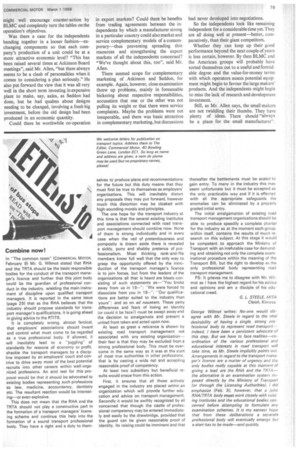Combine now!
Page 81

If you've noticed an error in this article please click here to report it so we can fix it.
In "The common room" (COMMERCIAL MOTOR. February 9) Mr. G. Wilmot stated that RHA and the TRTA should be the basic responsible bodies for the conduct of the transport manager's licence and further that this joint body could be the guardian of professional conduct in the industry, wielding the main instrument of discipline upon qualified transport managers. It is reported in the same issue (page 29) that as the RHA believes that the industry should propose standards for transport manager's qualifications, it is going ahead in giving advice to the RTITB.
It is completely wrong, almost farcical, that employers' associations should invent and control what must come to be regarded as a true professional body. If allowed, it will inevitably lead to a "juggling" of standards for reasons of economy or profit, shackle the transport managers by a discipline imposed by an employers' court and contrive to drive away most of the best potential recruits into other careers within well-organized professions. An acid test for this proposal would be that it should be advocated to existing bodies representing such professions as law, medicine, accountancy, dentistry etc. The resultant reaction would be interesting—or even explosive.
This does not mean that the RHA and the TRTA should not play a constructive part in the formation of a transport managers' licensing scheme and continue this help into the formation of a sound transport professional body. They have a right and a duty to them selves to produce plans and recommendations for the future but this duty means that they must first be true to themselves as employers' organizations. This will inevitably distort any proposals they may put forward, however much this distortion may be cloaked with high-sounding morals and principles.
The one hope for the transport industry at this time is that the several existing institutes and associations connected with road transport management should combine now. None of them is strong individually and in every case when the veil of pretentiousness and pomposity is drawn aside there is revealed a sickly, puny and shabby pretence of professionalism. Most thinking rank-and-file members know full well that the only way to grasp the opportunity offered by the introduction of the transport manager's licence is to join forces, but from the leaders of the organizations all that is heard are bleats consisting of such statements as—"You broke away from us in 1 9--": "We were forced to dissociate from you in 19--"; "Our qualifications are better suited to the industry than yours": and so on ad nauseam. These petty differences and fears of losing an identity (or could it be face?) must be swept away and the decision to amalgamate and present a united front taken and acted upon now.
At least as great a reticence is shown by existing road transport management not associated with any existing organization— their fear is that they may be excluded from a strong professional body. This must be overcome in the same way as it was at the start of most true authorities in other professions, that is by casting a wide net and accepting reasonable proof of competency.
At least two subsidiary but beneficial results would ensue from this action.
First, it ensures that all those actively engaged in the industry are placed within an organization which will provide further education and advice on transport management. Secondly it would be swiftly recognized by all concerned that though the castle of professional competency may be entered immediately and easily by the drawbridge, provided that the guard can be given reasonable proof of identity, its raising could be imminent and that
thereafter the battlements must be scaled to gain entry. To many in the industry this may seem unfortunate but it must be accepted as the only practicable way and if it is effected with all the appropriate safeguards the anomalies can be eliminated by a properly graded initial entry.
The initial amalgamation of existing road transport management organizations should be able to produce speedily a complete charter for the industry as at the moment each group, within itself, contains the results of much research on this subject. At this stage it would be competent to approach the Ministry of Transport with an irrefutable case for demanding and obtaining not only the complete examinational procedure within the meaning of the Transport Bill, but the right to develop as the only professional body representing road transport management.
PS: It grieves me to disagree with Mr. Wilmot as I have the highest regard for his advice and opinions and am a disciple of his educational creed.
G. L. STEELE, MITA Cleish, Kinross.
George Wilmot writes: No-one would disagree with Mr. Steele in regard to the vital desirability of having a single, strong professional body to represent road transport— indeed, I have been a persistent advocate of this step. But we have to face realities—coordination of the various professional and educational interests in road transport will take time, as Mr. Steele implicitly points out. Arrangements in regard to the transport manager's licence are a matter of urgency and the only bodies really capable at this moment of giving a lead are the RHA and the TRTAthe alternative is an examination system im posed directly by the Ministry of Transport (or through the Licensing Authorities). did emphasize (Feb. 9), however, that a joint RHAITRTA body must work closely with existing Institutes and the educational bodies concerned before attempting to formulate any examination schemes. It is my earnest hope that from these deliberations a separate professional body will eventually emerge but a start has to be made—and quickly.








































































































































































